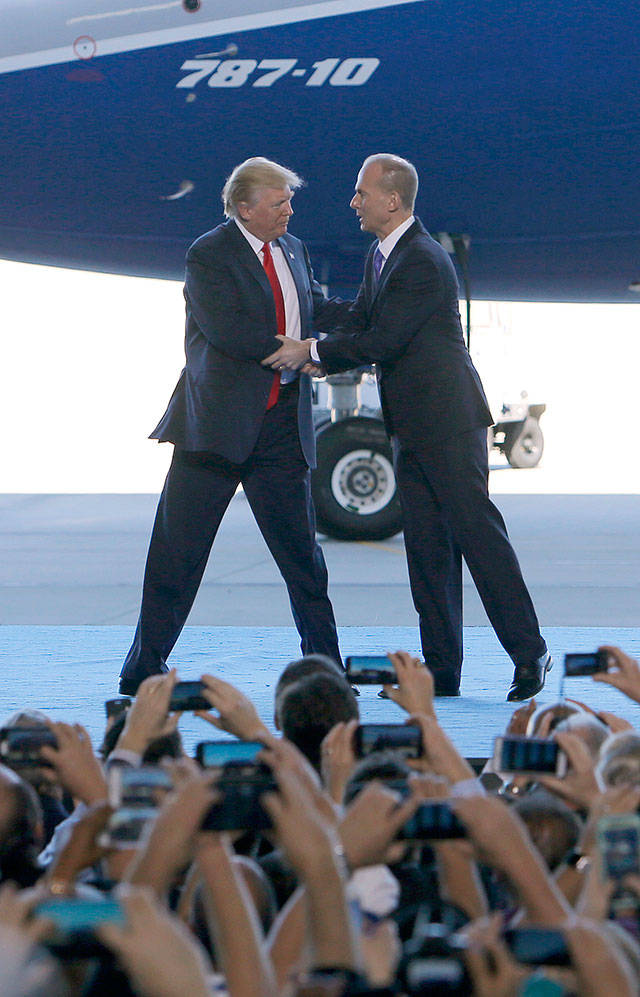By Danielle Paquette, The Washington Post
Just before President Donald Trump dismantled his manufacturing council, Marillyn Hewson, chief executive of Lockheed Martin, told her employees that she planned to stay on it.
“I believe the mission of the advisory council remains critical to our business in the United States,” she wrote Wednesday in a companywide email, obtained by The Washington Post. “I feel strongly the best way to represent our company and our employees is to continue to have a seat at the table.”
Then Trump yanked that seat away.
“Rather than putting pressure on the businesspeople of the Manufacturing Council & Strategy & Policy Forum, I am ending both,” he tweeted. “Thank you all!”
Dennis Muilenburg, head of Boeing, was another executive who spoke up to say he would not vacate his role. His company statement focused on adhering to the “mission” of Trump’s council.
“Boeing fully supported the purpose and mission of the manufacturing council, and we will continue to advocate for government policies and actions that support U.S. manufacturing jobs, improve America’s global competitiveness, and spur economic growth and prosperity for the country,” Boeing spokesman John Dern said. “We also remain firmly committed to the core values upon which our company and country were built, including equality and respect for all people.”
The quick turn of events for Hewson underscores the risks companies face when they engage with a president as unpredictable as Trump. The corporate leader stood with the president, saying that keeping proximity to power was in the company’s best interest despite the public pressure, only to lose that proximity in Trump’s sudden shift.
By the time Hewson’s note hit her staff’s inboxes, eight executives had already quit the council over Trump’s response to the neo-Nazis and Ku Klux Klan members who marched this weekend in Charlottesville. (The president had said “both sides” bear responsibility for the chaos that turned deadly, including groups who came to protest the men shouting Nazi slogans.)
Hewson condemned the white supremacist groups in her email and then said her decision to remain on Trump’s board “was not related” to the events in Charlottesville.
“Racism, discrimination and hate will not be tolerated at Lockheed Martin,” she wrote, “and we will continue to advance a culture of diversity and inclusion for all our employees.”
Generally, the most powerful business leaders in the United States, such as Hewson, do not pen opinions on every presidential move — but she and 24 other CEOs had agreed in January to sit on his manufacturing council, which was supposed to provide regular guidance on creating more jobs on American soil. (It had met only once in seven months.)
The council fell under scrutiny Monday when Kenneth Frazier, the CEO of Merck, announced he had quit because Trump had taken two days to explicitly denounce the white supremacists.
Then #QuitTheCouncil began trending, and the heat flared on leaders like Hewson to take a stand.
David Mayer, a business professor who focuses on ethics at the University of Michigan, said anyone who runs a company and works with the president should be prepared to deal with public pressure. An executive these days cannot disconnect her extracurriculars from her reputation.
“Increasingly, business leaders are the most powerful social change agents — often much more influential than elected politicians,” he said.
Frazier, he noted, was seen as an “early resistor,” which earned him more credit among those who disagree with how Trump handled the situation in Charlottesville. (Merck’s stock price that day jumped to the highest point in a month.)
“The leaders who remained on the council and then got ‘dumped’ by Trump when he broke up the councils look the worst,” Mayer said, “although it is unclear if there will ultimately be any fallout from their reticence to challenge him.”
Among the leaders who stuck around was Walmart CEO Doug McMillon, who criticized Trump without handing in his resignation.
“As we watched the events and the response from President Trump over the weekend, we too felt that he missed a critical opportunity to help bring our country together by unequivocally rejecting the appalling actions of white supremacists,” McMillon said.
Hewson’s refusal to leave — an argument the Lockheed Martin chief should stick around for influence — probably won’t damage her image in the long run, said Robert Bies, a professor of management at Georgetown University.
“That is a principled stance, as much as a principled stance as people leaving,” he said. “We need to engage with people, in this case the president, if we’re going to have any influence.”
Trump’s choice to ax his advisory councils came a day after he said he could replace any “grandstander” who walked away. His tune changed after his Strategy and Policy Forum, another executive group headed by Blackstone’s Stephen Schwarzman, made plans to disband.
Talk to us
> Give us your news tips.
> Send us a letter to the editor.
> More Herald contact information.

























